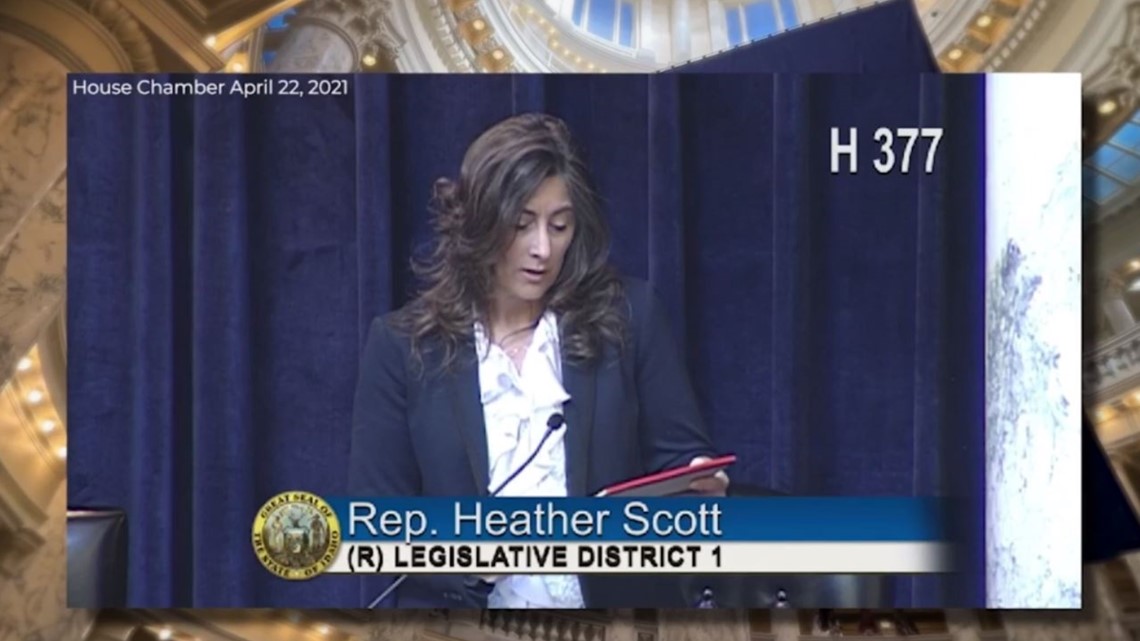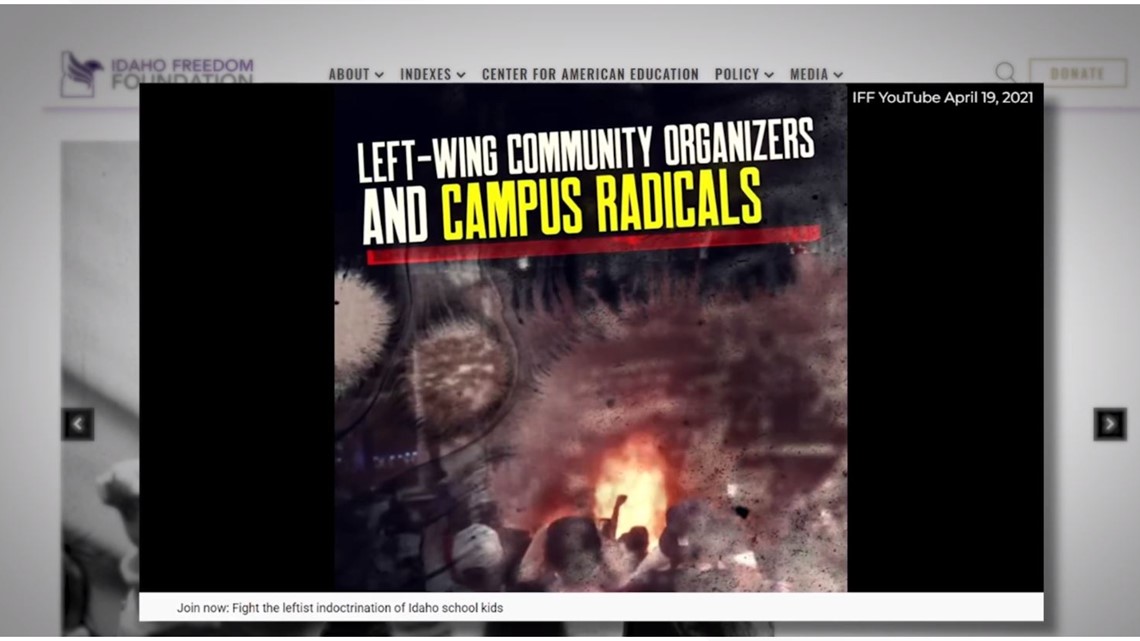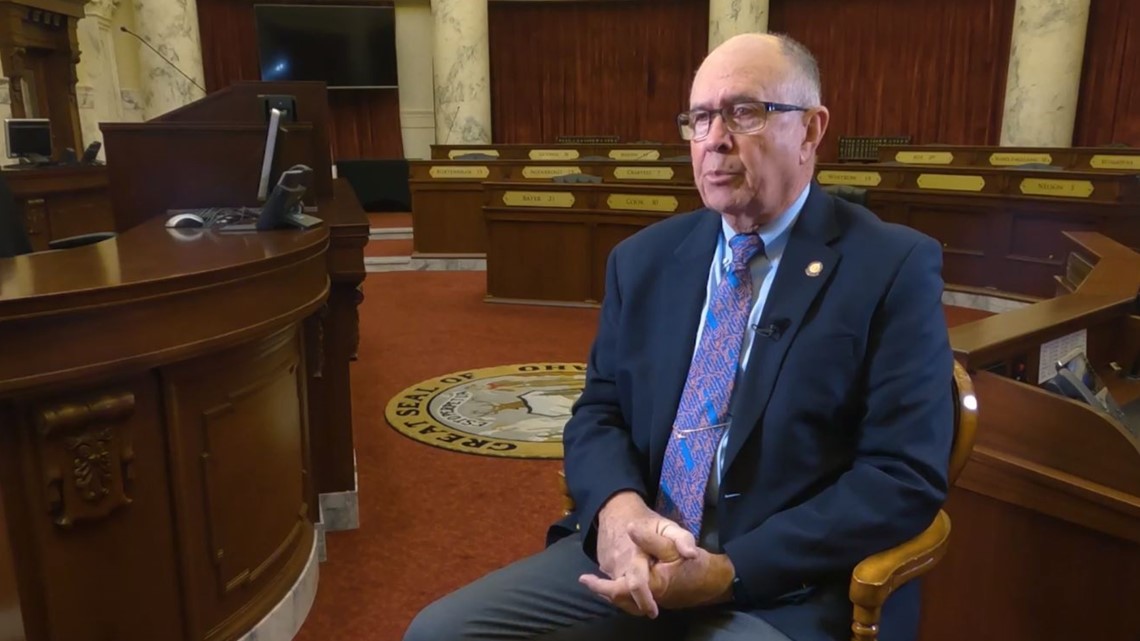BOISE, Idaho — An Idaho nonprofit that began in 2009 as a conservative think tank has risen to wield enormous power over what bills are brought forward during a legislative session, what talking points lawmakers make on the floor of the House or Senate, and even how legislators cast their votes.
The Idaho Freedom Foundation's influence could be felt most keenly last session on the subject of Critical Race Theory. A college-level academic concept, the approach advances the idea that racism is a social construct embedded in policy decisions and law, rather than existing solely in the biases of individual people.
Although the concept has been around for decades, it has become a conservative watchword in the last year or so for those who claim that it is a form of indoctrination designed to make white people feel ashamed or inferior. Opponents also say that CRT is being taught to Idaho children as young as preschool.
That's not true, according to Idaho teachers at every level of education.
But you would not know that listening in to debates on the House floor over Critical Race Theory last session.
"Critical Race Theory makes students feel bad, or inferior, or superior, sometimes based on the color of their skin," Rep Ron Nate, R-Rexburg said.
Rep. Heather Scott, R-Blanchard, described the concept as a "poison in our schools" and called for it to be outlawed.
"This bill needed to be passed years ago, this has been creeping through our schools forever," Scott said. She took particular aim at the Pulitzer Prize-winning 1960 novel To Kill a Mockingbird, which tells the story of a Black man falsely accused of rape, arguing that a teacher had told her the book was inappropriate.


"The message was made clear: White people were bad, Black people are innocent victims, and the students were encouraged to believe there was an endless era of Black victimization," she said.
The concept came up again during a debate over a $6 million federal grant for pre-K education in Idaho - the same grant that had passed a year before. Idaho Freedom Foundation-backed lawmakers argued that the federal money was a pipeline to indoctrination from CRT teachings.
"You are voting for social justice ideology to be given through grant money to our little ones," Rep. Priscilla Giddings, R-White Bird, said.
That could not be farther from the truth, said Heather Lee, who works for the Idaho Association for the Education of Young Children.
"I just want to be sure that people are clear that when we have a 3.5-hour program, we are busy wiping noses, making sure shoelaces are tied, putting crayons and scissors and pencils into the hands of young children" - not discussing systemic injustice, she said.
Lori Fascilla, executive director of the Giraffe Laugh Early Learning Centers, was even blunter in her response: Absolutely not.
"It's hard for me not to laugh" at the idea, she said.
The grant would have been a major benefit to rural communities and families. But enough lawmakers were persuaded, so the attempt to secure $18 million over three years failed.
On top of that, the Legislature cut $2.5 million from the higher education budget in 2021, claiming they were no longer going to fund programs - including multicultural student services and a women's center - they believed amounted to CRT.
Boise State University took the biggest hit, losing $1.5 million.
Janie Ward-Engelking, D-Boise, said her colleagues acted without any evidence that Critical Race Theory was a part of Idaho schools - or even a clear definition of what it was.
"It's being thrown out there like a boogeyman that we have in our children's bed, and the reality is, it might scare them but it's not real," she said.
After their budgets were cut, both Boise State and the University of Idaho hired a law firm to conduct their own investigation into the lawmakers' CRT claims. In both cases, they found no evidence to back up any of the allegations.
"In short, the entire social justice narrative on which the University of Idaho was penalized $500,000 was a false narrative created by conflict entrepreneurs who make their living sowing fear and doubt with legislators and voters," U of I President Scott Green said.
Critical Race Theory is not being taught on the K-12 level either, former president of the State Board of Education Debbie Critchfield said,
"The Board of Education does not support indoctrination of any kind, and at any level, and I haven't talked to anyone that does," she said.
So where did this misinformation come from? And how did it catch the ears of so many state legislators?
Most point to the Idaho Freedom Foundation.


The nonprofit, which bills itself as on a mission to "make Idaho into a Laboratory of Liberty by exposing, defeating, and replacing the state's socialist public policies," has pages and pages of essays and videos claiming that Idaho schools are bent on indoctrinating and discomforting their students.
IFF President Wayne Hoffman and other members of the Idaho Freedom Foundation declined to participate in interviews for this story. On Wednesday afternoon, the group sent out an email blast to their supporters saying that the media is trying "to smear the Idaho Freedom Foundation and lawmakers who defend the principles of liberty in the capitol."
In an April 12, 2021, video, Hoffman raises the specter of small children exposed to "woke storytime" if Idaho funded statewide pre-kindergarten programs.
"Tell them you do not want your kids exposed to the left's mindless drivel that is sweeping our education system," Hoffman urged. "It's not just in Idaho, and it's not just in our colleges and universities, but it's also in our elementary, middle, and high schools."
In another video, posted a month earlier, IFF Legislative Affairs Director Fred Birnbaum urges lawmakers to slash higher education budgets.
"The best way for them to get the attention of these universities that are pursuing the social justice agenda is to reduce the appropriation by the amount of the social justice spending or something close to that," he says.
That take was not a surprise to Green, the University of Idaho president.
"The thing about the IFF is they're on record as not believing any money should be going to public education in the State of Idaho, and so their goal really is to defund public education in the State of Idaho," he said.
Senate President Pro Tem Chuck Winder said he has seen a change in the group over the last five years, adding that the IFF has become "more of a political movement" than a think tank.
"They bring in different issues that are going on in other parts of the country and say, 'we can't ever let this happen in Idaho' and they go after people that say, 'well, it's not happening in Idaho," he said.


The nonprofit is now affiliated with the State Policy Network, a nationwide chain of like-minded groups. That transformation coincides with the 2016 creation of the Idaho Freedom Action, the lobbying arm of the IFF, which uses the same offices and staff.
The Idaho Freedom Foundation also puts out a "Freedom Index," under which a handful of analysts scores bills that align with their "12 criteria of freedom," as well as assigning scores to individual lawmakers based on whether or not they supported IFF-approved legislation.
Some of the loudest voices during the education funding debates came from those who have the highest scores on the Freedom Index.
Sometimes, IFF directives on whether or not to support a bill are sent to legislators while they are still in committee, Winder said.
"If they want to rate lawmakers' bills, do it after they've had a chance to vote, don't tell people how to vote," Winder said. "I think you can ask anybody around this building - they'll change their ratings in the middle of a hearing, they'll send out text messages, they'll send out emails encouraging and telling people how they should vote."
During a 2021 City Club virtual conversation, Winder called the number of legislators who unquestioningly toe the IFF's line his "greatest disappointment" of the session and a threat to the state's democracy.
"If they were an honest broker in this process they wouldn't be telling people how to vote," he told KTVB. "Each individual is elected by their districts to represent their constituents, not to represent a special interest group."
Watch the 4-part series below:
1.
2.
3.
4.
Watch more Idaho politics:
See all of our latest political coverage in our YouTube playlist:

